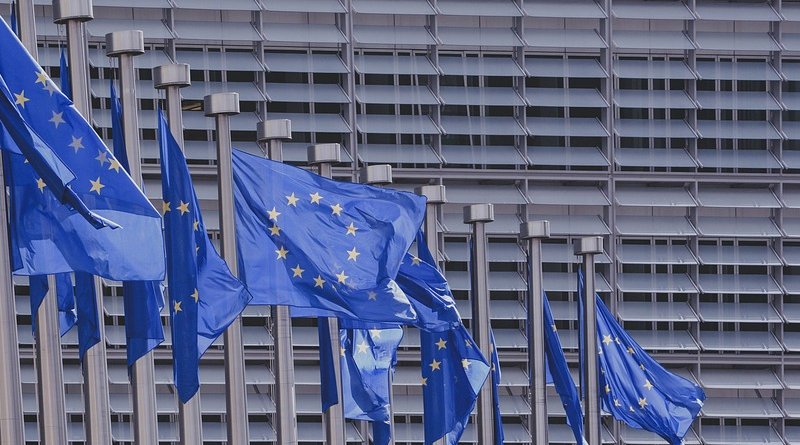Commission Loses Out In Apple-Ireland Tax Battle, Announces Tax Abuse Clampdown
By EurActiv
By Samuel Stolton
(EurActiv) — US technology giant Apple did not unlawfully benefit from state aid as part of corporate tax rulings in Ireland, the general court of the EU said on Wednesday (15 July). The decision annuls the European Commission’s bid to claim €13 billion back in unlawful tax advantages.
The ruling comes on the same day as the EU executive announced a raft of new measures as part of its Tax Package, aimed at countering unlawful tax abuse and unfair tax competition.
For its part, the Commission has said that it will consider how best to respond. A statement from EU competition chief Margrethe Vestager noted that her services would “carefully study the judgment and reflect on possible next steps”.
“The Commission stands fully behind the objective that all companies should pay their fair share of tax,” the statement added.
“If Member States give certain multinational companies tax advantages not available to their rivals, this harms fair competition in the EU. It also deprives the public purse and citizens of funds for much-needed investments – the need for which is even more acute during times of crisis.”
In 2016, the EU executive instructed Ireland to recover just over €13 billion from Apple, following tax rulings in 1991 and 2007 in the country which the Commission argued represented the illegal state aid, in favour of Apple Sales International (ASI) and Apple Operations Europe (AOE), which were companies incorporated in Ireland but not tax resident in the country.
But the courts countered the Commission’s claims, saying that “although the General Court regrets the incomplete and occasionally inconsistent nature of the contested tax rulings, the defects identified by the Commission are not, in themselves, sufficient to prove the existence of an advantage.”
Wednesday’s ruling is a big win for Ireland’s corporate tax system, which at 12.5% is one of the lowest headlines tax rates in Europe. Only Hungary (9%) and Bulgaria (10%), offer more favourable perks.
A statement from Ireland’s Department of Finance praised the ruling by Europe’s highest court.
“Ireland has always been clear that there was no special treatment provided to the two Apple companies – ASI and AOE. The correct amount of Irish tax was charged taxation in line with normal Irish taxation rules,” the statement read.“Ireland granted no state aid and the decision today from the Court supports that view.”
Tax Package
Meanwhile, the Commission on Wednesday published a raft of new measures intended to ensure fair taxation in the EU, as part of its new Tax Package.
It includes a Tax Action Plan which features 25 actions designed to simplify taxation procedures and to assist member states in employing new technologies to “fight tax fraud, improve compliance, and reduce administrative burdens.”
Moreover, the package also puts forward a proposal on administrative cooperation, which extends tax transparency riles to digital platforms, meaning that firms participating in platform economy trade will be subject to new disclosure requirements.
“This new proposal will ensure that Member States automatically exchange information on the revenues generated by sellers on online platforms,” the Commission states.
A third pillar of the package, a Communication on tax good governance, proposes a reform on the Code of Conduct addressing tax competition and harmful tax practices worldwide, in a bid to encourage third countries to improve their tax governance formalities.
Digital Services Tax
Meanwhile, the Commission is again looking at the idea of establishing a Digital Services Tax as a means to chart its recovery from the coronavirus crisis, which it believes could generate up to €1.3 billion per year for the EU budget.
Council President Charles Michel’s most recently revamped plans for the EU’s multi-annual financial framework notes that the Commission will put forward in the first semester of 2021 proposals on a digital levy, with a view to their introduction “at the latest” by January 2023.
However, despite the Commission’s intentions in this regard, the executive is well aware of the challenging road ahead for the EU to establish its own digital services tax, not least because tax legislation requires unanimous agreement in the Council.
Moreover, speaking earlier this week to the European Parliament’s Economics Committee, Benjamin Angel of DG Economic and Financial Affairs in the Commission, noted that it would not be so easy to move ahead with the EU’s plans to introduce a bloc-wide levy, should talks at the OECD level continue into the near future.
Angel said that there was “no doubt” that a global agreement on a digital services tax is preferable to “a situation where the EU would move on its won.”
Attempts to introduce a bloc-wide digital services act faltered last year, following opposition from Ireland, Finland and Sweden and others to a planned 3% levy on companies earning €750 million in revenue, €50 million of which would need to be EU taxable revenue.
As a result of this, France, Spain, Italy and Austria made clear their intentions to push forward with a digital services tax, following the failure to agree on bloc-wide measures.

